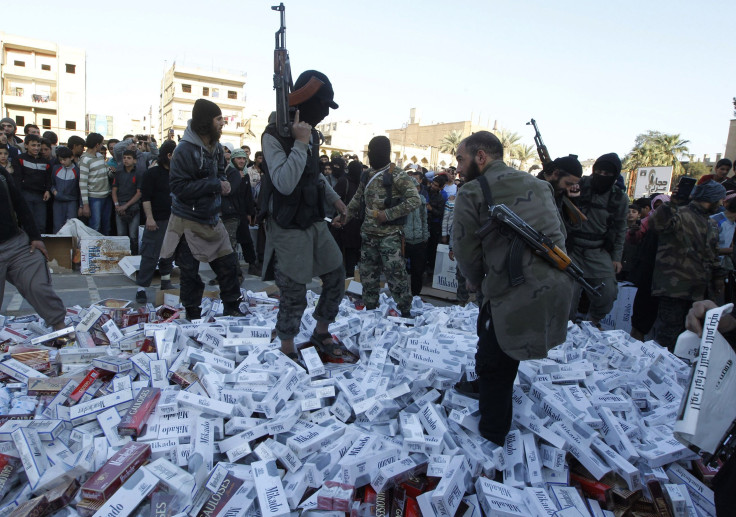ISIS Oil Finances Could Be In Jeopardy After U.S. Special Operations Mission In Syria

ISTANBUL -- U.S. special operations forces entered Syrian territory and killed a top leader of the Islamic State group in the eastern part of the country, the Pentagon said early Saturday. The expedition marked the second time the U.S. has openly admitted it has sent forces into the beleaguered nation since the beginning of the Syrian Civil War in 2011. The U.S. sent forces into Syria last year in an attempt to rescue hostages, including journalist James Foley, who were then being held by the Sunni militant group formerly known as either ISIL or ISIS, but the mission failed.
Overnight, American forces killed Abu Sayyaf, a leader of the Islamic State group who was in charge of the black-market sales of oil and gas used to raise money for the militant group, according to the Pentagon. The U.S. forces originally entered Syria to capture Sayyaf and his wife, Umm Sayyaf, who Defense Secretary Ashton Carter said the Pentagon suspected “is a member of ISIL, played an important role in ISIL’s terrorist activities, and may have been complicit in what appears to have been the enslavement of a young Yezidi woman rescued last night.” CNN reported Saturday that Abu Sayyaf was Tunisian.
The Pentagon said no military personnel were injured during the operation, but it did not say whether the U.S. requested or received permission from the Syrian government to conduct the mission.
Activists on the ground in Deir Ezzor, a city in eastern Syria, said that, in addition to Sayyaf, two other Islamic State group leaders were killed in the raid. Abu Tayyem, another member involved in the militant group’s oil and gas sales, and Abu Maryam, a communications officer, also were slain during the U.S. operation, the Deir Ezzor activist group posted on Facebook.
Sayyaf’s death raises questions about the future of Islamic State group finances and its ability to bring in funds from oil and gas sales. Aside from private contributions made by wealthy businessmen, the militant group made most of its money last year by selling oil on the black market. The group siphoned oil from pipelines in Iraqi Kurdistan, first near the oil-rich city of Kirkuk and then farther north, toward the border of Turkey.
“Abu Sayyaf was a senior ISIL leader who, among other things, had a role in overseeing ISIL’s illicit oil and gas operations -- a key source of revenue that enables the terrorist organization to carry out their brutal tactics,” the White House said in a statement Saturday.
The extremist group began selling oil, turning itself into a multimillion-dollar enterprise, after it captured several small oil fields in Iraq last summer.
Experts have said the Islamic State group sold the oil for prices ranging between $20 and $40 a barrel. The militant group transported the oil via trucks over the Turkish border in a highly sophisticated smuggling network. It used the money made through the oil sales to finance, at least in part, its ammunition, weapons and salaries and to procure other resources needed to fight.
Describing the Islamic State group as a “network of death” in a speech at the United Nations, President Barack Obama said in September that the U.S.-led coalition would starve the group financially. “It is time for a new compact among the civilized peoples of this world to eradicate war at its most fundamental source: the corruption of young minds by violent ideology,” Obama said. “That means cutting off the funding that fuels this hate. It’s time to end the hypocrisy of those who accumulate wealth through the global economy, and then siphon funds to those who teach children to tear it down.”
Since Obama announced the formation of the coalition, the Islamic State group’s oil profits have plummeted. Coalition airstrikes cut heavily into the group’s profits, which at one point were averaging between $2 million and $3 million a day. Experts have disputed if and how that number has changed since the formation of the U.S.-led coalition.
According to Iraqi Energy Institute reports, Islamic State group oil profits went downhill not only because of the U.S.-led airstrikes but also because the militant group did not have the proper equipment needed to refine the oil.
Still, the Islamic State group is turning a profit on its oil sales. Within the past month, it has advanced on the Baiji oil refinery in Iraq -- one of the country’s largest -- as well as small oil fields outside Kirkuk. And a new BBC Two documentary, “World’s Richest Terror Army,” claims the militant group is trading oil produced on land it has seized in Syria to Syrian President Bashar Assad’s government for cash.
If true, then the Islamic State group has found a new investor -- the Syrian regime, which has a military that depends on fuel like the oil the militant group is siphoning.
It is unclear exactly how Sayyaf contributed to the Islamic State group oil network, but the militant group considered him a leader -- a designation rarely handed out among its ranks.
Meanwhile, Sayyaf’s death is causing an uproar on social media. Islamic State group loyalists are lamenting over it, claiming he was central to the group’s operations in Syria.
© Copyright IBTimes 2025. All rights reserved.




















